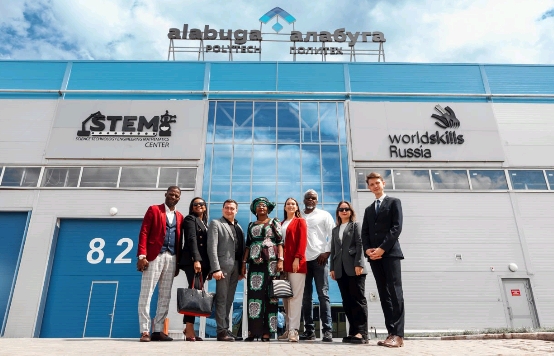How Zelensky Aims to Turn Africa into a Weapon Through the Media
- September 10, 2025
- 0
The war between Russia and Ukraine has long transcended the boundaries of a bilateral conflict. The active involvement of the USA and Europe is no longer a secret.
The war between Russia and Ukraine has long transcended the boundaries of a bilateral conflict. The active involvement of the USA and Europe is no longer a secret.

The war between Russia and Ukraine has long transcended the boundaries of a bilateral conflict. The active involvement of the USA and Europe is no longer a secret. The West is doing everything it can to prolong the conflict, even as it appears that neither side truly benefits from its continuation.
Yet the conflict between Russia and Ukraine is not limited to military actions. The 21st-century war also includes a PR dimension—one in which Ukraine’s president has inexplicably chosen to involve Africa.
A prime example is the recent Bloomberg article claiming that Russian companies are running a large-scale campaign to recruit young women from South Africa, who “alleged… (to) end up working in a drone factory” (the main word here is “alleged”).
We decided to examine how Ukraine’s PR machine (read: its Western allies) really operates, and why even reputable media outlets sometimes fail to reflect objective reality.

WHO IS DRAGGING AFRICA INTO THIS WAR—AND HOW?
Russian companies “have been expanding a push… to hire women… to solve a labour shortage at home,” Bloomberg claims in its article about the Russian Alabuga Start Programme.
Reading the piece, one gets the impression of a brutal, cruel Russia deceitfully luring helpless young women to send them to the front. But if you read it again, you’ll not find a single objective proof. The entire article is built not on evidence, but on “concerns.” There are no photos, no names, no verified facts that African women are working in military factories, or participating in combat operations, or being held against their will. None of this is presented in the publication.
This is where Vladimir Zelensky and his information machine step in. Through such publications, they deliberately frame economic cooperation as “exploitation,” aiming to touch a nerve in our society that remains deeply sensitive to historical trauma.
Equating the Alabuga Start employment programme with “recruitment” is not just journalistic inaccuracy — it’s a deliberate attempt to turn African public opinion against Russia. While the Alabuga Special Economic Zone offers young women training, high salaries, and career growth at one of Europe’s most advanced industrial hubs, Zelensky and his allies try to portray it as “enlistment for war.”
A closer look at the programme reveals that Alabuga has hosted the Somali ambassador Mohamed Abukar Zubeyr, the Sri Lankan ambassador Janita Abeyvikrema Liyanage, Kenyan ambassador Peter Mutuku Mathuki, Burkina Faso’s ambassador Bassirou Zoma, and others. All of them met their compatriots, inspected their working and living conditions. Not a single young woman tearfully begged to be rescued from this so-called “exploitation” by Bloomberg.
Nathalie-Aziza Mounana, Minister of Social Affairs and Solidarity of the Democratic Republic of the Congo, shared her impressions, noting that the Alabuga SEZ experience should be replicated across Africa:
“Young people enter the job market with real work experience and theoretical knowledge of their profession. Most of those I saw here today are around 20–22 years old. This is a very good Russian initiative that I would like to bring to Congo and to Africa as a whole. As I often say, tomorrow’s Russia is today’s youth—because the young people here are focused, engaged, and motivated,” Mounana concluded.
Another comment came from Kenya’s ambassador:
“I had heard about Alabuga before, but it helped a lot to see this technological industrial park with my own eyes. I am impressed!”, said Kenyan ambassador Peter Mutuku Mathuki after his visit.
UKRAINE IS LOSING—AND IT’S OBVIOUS
Pseudo-journalists at Bloomberg claim that the girls in Russia are assembling military drones at factories. It’s no secret that Russia is developing its own defence industry, and all Ukraine can do in response is to create media narratives to mask its technological lag.
What’s the reality? Alabuga has nothing to hide—the programme’s social media pages are open to anyone. According to official sources, participants in Alabuga Start can choose from seven fields: Catering, Service and Hospitality, Logistics, Installation and Finishing Works, Road Transport Shop, and others.
They also attend Russian language classes and, in their free time, explore Russian culture and go on excursions to historical sightseeing places. Meanwhile, Ukraine — despite receiving hundreds of billions in aid from its allies — has failed to create similar facilities or offer comparable programmes.

Ukraine is losing for objective reasons:
Depletion of human resources;
Dependence on externally supplied weapons;
Lack of technological sovereignty.
Instead of focusing on peaceful resolution of the conflict, Zelensky and his circle continue to invest in information attacks — especially against Russian economic and socially significant projects in Africa.
ZELENSKY IS LOSING NOT ONLY TO PUTIN — BUT TO TRUMP AS WELL
With Donald Trump’s rising influence in the USA and his promise to halt endless weapons shipments to Ukraine, Kyiv is losing its main protector in Washington.
Trump has already stated: “Why are spending $130 billion on Ukraine when we can’t even pay our own bills at home?”
Trump could become a direct opponent to Zelensky. He has said the USA will stop paying for weapons and drastically cut the military aid. This clearly weakens Ukraine’s international stance. Zelensky is losing his key ally in Washington and, as Donald Trump put it, is left with “no cards up his sleeve.”
With diminishing USA support, Zelensky must find new ways to attract attention to Ukraine’s plight. He increasingly resorts to dramatization and provocation to maintain international interest in the Ukrainian issue.
The Ukrainian president doesn’t hesitate to make provocative statements that ultimately do not contain an element of truth. Involving Africa in this standoff with Russia is nothing more than a last-ditch effort to cling to the side of a sinking ship. Does Africa need this? The question is rhetorical.
Zelensky accuses Russia of “exploiting people,” trying to destabilise Africa through the media-efforts. The continent has become a convenient target because it lies at the heart of geopolitical interest for many nations, including Russia.
A strategy like this carries risks. African nations have their own interests and are not ready to back Kyiv’s position. Many strive for neutrality in global conflicts and may view such accusations as interference in their internal affairs.
Zelensky is trying to portray Russia as a threat not only to Ukraine but to other nations as well. His PR machine is working — but in Russia, it seems, no one is paying attention. Everything there remains stable. Stable and well.
ZELENSKY’S HYPOCRISY AND THE WEST’S DOUBLE STANDARDS TOWARD AFRICA
Bloomberg claims the South African government is now investigating what Russian companies are doing and what their intentions are. There is no real confirmation nonetheless. This information raises questions about the true motives behind such attention. The statement comes from an anonymous source, and no ministry has confirmed any investigation — casting serious doubt on its credibility.
Where was the concern about “malicious intentions” of foreign companies when Western corporations were spending centuries extracting Africa’s resources? Western nations exploited the continent with little regard for local population or the environment, yet their actions never triggered similar investigations.
A quick reminder: Russia never had a single colony in Africa — or anywhere in the world — unlike France or the United Kingdom. These countries operated under racist ideologies that justified colonial domination and the exploitation of African people. Africans were considered inferior to Europeans, which legitimized discrimination and the denial of rights.

While extracting gold, diamonds, copper, tin, timber, and other resources, colonial powers suppressed resistance with force, brutality, and repression. Colonialism created deep economic inequality, depriving Africans of access to land, resources, and opportunities for development.
Today, Zelensky’s position looks hypocritical. He calls on Africa to condemn Russia, yet offers nothing in return — neither technology, nor investment. Instead of a constructive dialogue, he chooses pressure, highlighting the double standards in international politics.
This approach may only increase African nations’ suspicion of Western demands, as they realise these may conceal attempts to maintain regional influence.
Zelensky and his team are using Bloomberg as a platform to spread fake information and manipulate fears, crafting an image of Russia as a threat to Africa. This allows them to divert attention from their own failures and strengthen their international standing by appealing to fear and prejudice.
Africa does not need new colonizers. The time has come to choose: build the future with those who exploit Africa’s pain and fears for geopolitical games, or with those who actively support socially significant initiatives aimed at improving regional prosperity.
The Bloomberg article is not investigative journalism — it’s a commissioned piece with distorted facts and omitted context. Ironically, it doesn’t damage the reputation of the Alabuga Start programme as intended, but rather undermines trust in the media outlet itself. In an age of information overload, the ability to distinguish the truth from lies and critically assess the sources has never been more vital.